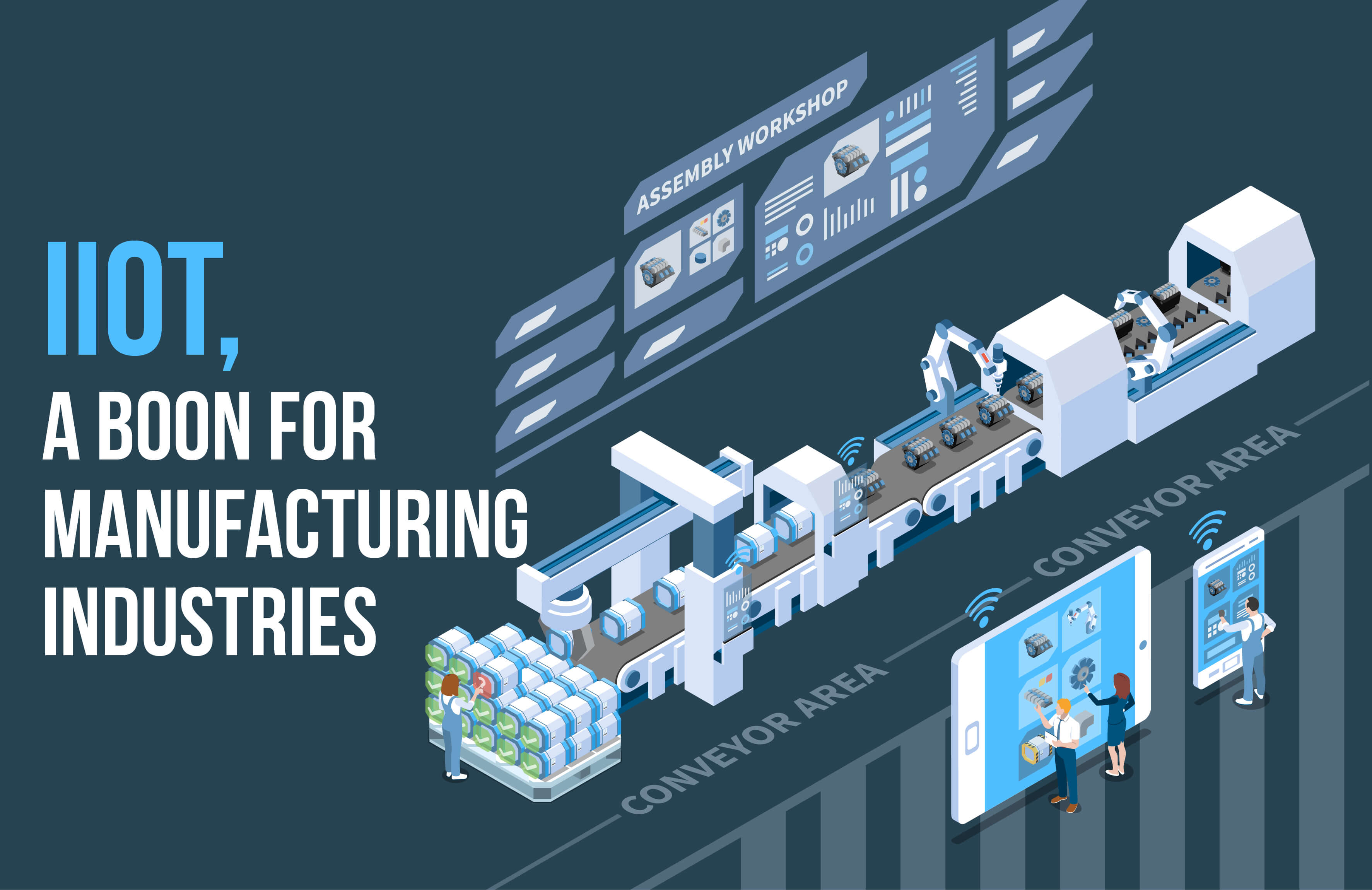
Introduction
We all know about IoT or Internet of Things; which is a network of all the objects that breathe-digits and codes and are allowed to communicate with each other in terms of sharing data, over the internet without human intervention.
We are experiencing a new industrial revolution like never before called INDUSTRIE 4.0! And IoT is said to be the key element of this revolution. Now what is IIoT? When the concept of IoT is applied to the large scale industries such as Manufacturing –IoT becomes IIoT which is; Industrial Internet of Things.
Industrial Internet of Things – IIoT
Industrial Internet of Things- uses embedded sensors, cloud-based data, and inter connected smart devices on the manufacturing floor to derive, artificial intelligence, predictive analytics and to ensure better industrial performance. This digital revolution brought by IIoT is said to leverage / in some cases has already leveraged discrete manufacturing industries incustomization, improved productivity, operability and time and extra operational costs conservation! We will see about it in details in a while…
IIoT, a boon for Manufacturing Industries
As the manufacturing industry front runners are coming to terms with digitization and automation; the industrial IoT market is rapidly evolving. As per this report issued by PwC, 90% of manufacturers tend to believe that digitizing the manufacturing process will be a boon and not a curse to the industry.
According to Zion Research, the Industrial Internet of Things (IIoT) market value will eventually reach $232 billion dollars by 2023. As per Accenture’s report, 46% of respondents among American companies see the Internet of Things as an opportunity to increase employee’s productivity.
For instance, the motorbike manufacturer firm Harley-Davidson used IIoT technology for effective transformation in its manufacturing facility. It helped reduce the overall bike production time from 21 days to just 6 hours. (Source –Google)
IIoT: Revolutionizing Manufacturing with Intelligent Connectivity
The Industrial Internet of Things (IIoT) is reshaping the manufacturing landscape, empowering industries to achieve unprecedented levels of efficiency, productivity, and innovation. By seamlessly integrating intelligent devices, advanced analytics, and cloud technologies, IIoT is transforming traditional manufacturing processes into agile, data-driven operations.
Benefits
Now, the tables have turned! The IIoT is a new driving force and is all set to change the manufacturing industry that has struggled in recent years due to talent shortages, traditional & linear manufacturing supply chains, heavy budgets and time taking production process.
Key Benefits of IIoT in Manufacturing
Enhanced Operational Efficiency:
- Predictive Maintenance: By analyzing sensor data, IIoT enables predictive maintenance, reducing unplanned downtime and optimizing maintenance schedules.
- Real-time Monitoring: Continuous monitoring of production processes allows for immediate identification and resolution of issues, minimizing disruptions.
- Optimized Resource Utilization: IIoT optimizes resource allocation by analyzing real-time data on equipment usage, energy consumption, and material flow.
Improved Product Quality:
- Quality Assurance: IIoT enables real-time quality monitoring, ensuring adherence to stringent standards and minimizing defects.
- Traceability: By tracking products throughout the supply chain, IIoT enhances product traceability, facilitating recalls and improving customer satisfaction.
Accelerated Time-to-Market:
- Agile Manufacturing: IIoT facilitates agile manufacturing by enabling rapid response to market changes and customer demands.
- Faster Product Development: By streamlining design, prototyping, and testing processes, IIoT accelerates product development cycles.
Enhanced Supply Chain Visibility:
- Supply Chain Optimization: IIoT provides real-time visibility into the supply chain, enabling efficient inventory management and logistics.
- Risk Mitigation: By identifying potential disruptions early on, IIoT helps mitigate risks and ensure a reliable supply chain.
IIoT Use Cases in Manufacturing
Smart Factories:
- Automated production lines, robotic systems, and autonomous vehicles collaborate seamlessly to optimize production processes.
- Digital twins of physical assets enable virtual testing and optimization.
Connected Supply Chains:
- Monitoring stock levels, delivery status, and supplier efficiency instantly.
- Using predictive insights to forecast demand shifts and streamline supply chain functions
Product Lifecycle Management:
- Digital product passports that capture a product's entire lifecycle, from design to disposal.
- Remote monitoring and diagnostics to ensure product performance and customer satisfaction.
Data-Driven Insights and Decision-Making
- IIoT opens up a wealth of data that can be harnessed to gain deeper insights into operational performance. By using advanced analytics and AI, manufacturers can identify trends, patterns, and areas for improvement that were previously undetectable. This data-driven approach enables more informed decision-making, helping businesses stay competitive in an increasingly fast-paced market. IIoT not only enhances operational performance but also drives innovation, allowing manufacturers to create personalized products and services that cater to evolving consumer needs.
IIoToffers a hopeful future for theManufacturing industry:
- It will ensure employee safety and improve the quality of work & productivity expected from them.
- Manufacturing industries will witness reduced down time. IIoT will keep a thorough check on Machine’s health, preventing any sudden breakdown and damage which will affect the production time.
- Manufacturing industries deal with tons of goods, which come in and go out on a daily basis. To find, track and organize these goods means investment of a whole lot of time, ultimately causing delay and inefficiency in the work cycle, which could be managed with LOCATION TRACKING, which would be another great significance of using IIoT.
At the End
Industrial IoT is the future of manufacturing industries! IIOT promises - Enhanced Product Quality Controls, Real-time insights, Improved Inventory Management, Asset Security, Supply Chain Visibility & Cost Savings.
The Industrial Internet of Things holds the potential to revolutionize industries by improving efficiency, safety, and quality while reducing costs and downtime. As IIoT technology continues to evolve, its impact on the manufacturing sector will only become more profound, shaping the industry for years to come.
As IIoT develops further, it will lead the charge in the next industrial revolution. By embracing digital transformation and leveraging the power of IIoT, manufacturers can unlock new opportunities, improve operational efficiency, and deliver superior products and services.
